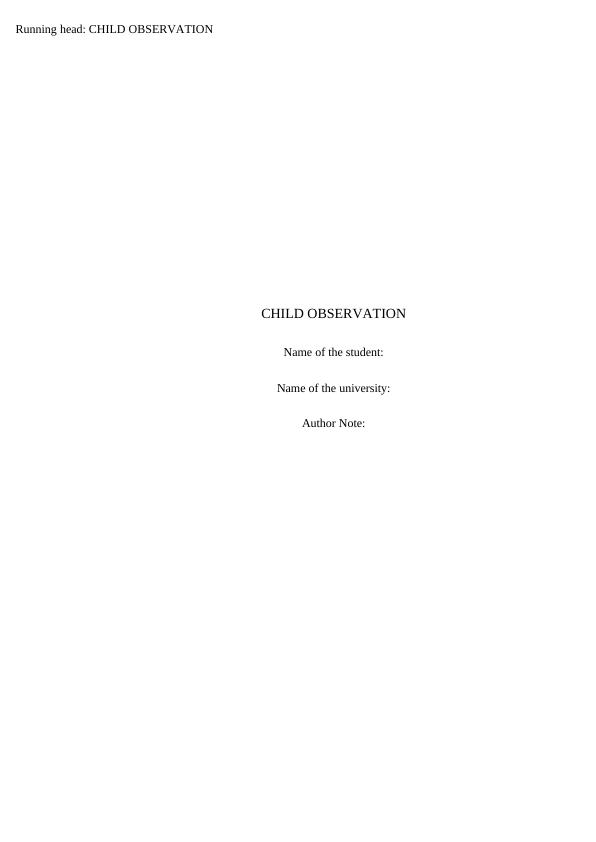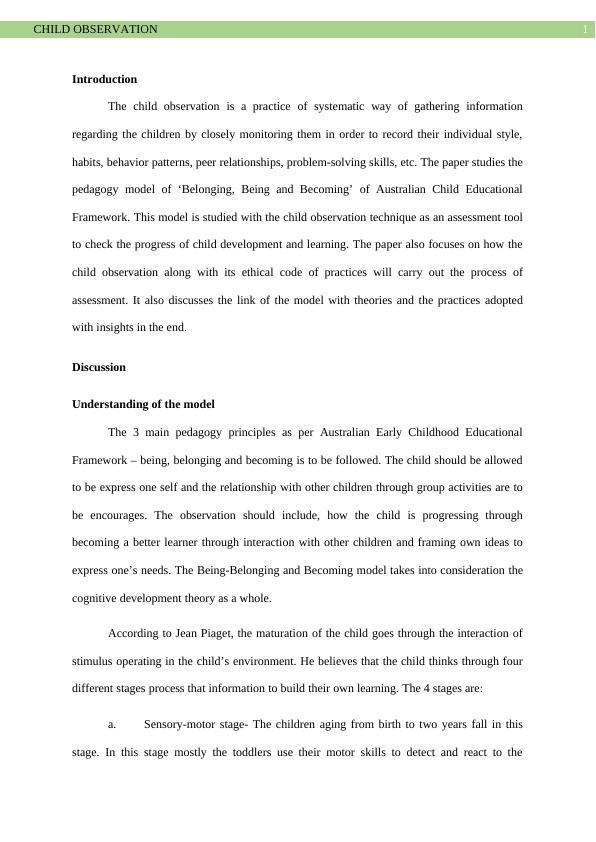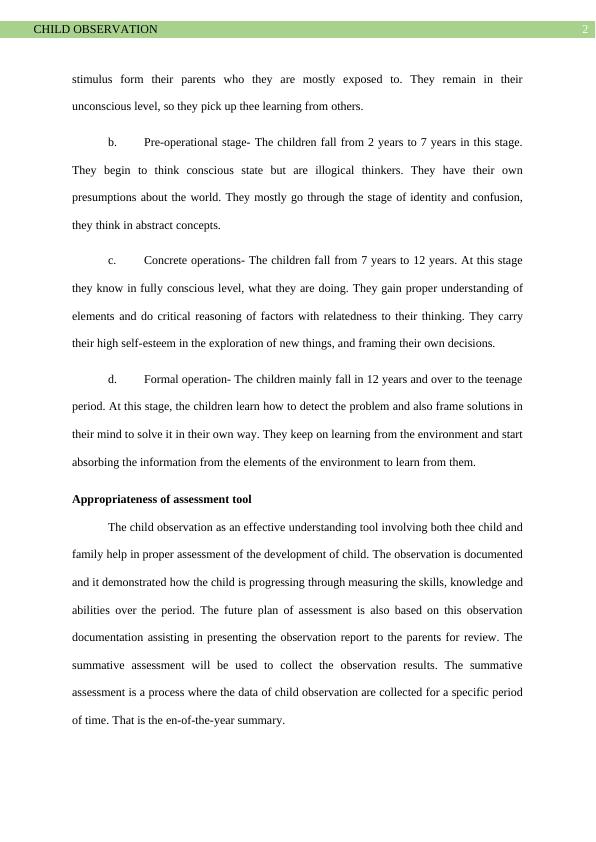The paper studies the pedagogy
Added on 2022-09-05
7 Pages1556 Words17 Views
Running head: CHILD OBSERVATION
CHILD OBSERVATION
Name of the student:
Name of the university:
Author Note:
CHILD OBSERVATION
Name of the student:
Name of the university:
Author Note:

1CHILD OBSERVATION
Introduction
The child observation is a practice of systematic way of gathering information
regarding the children by closely monitoring them in order to record their individual style,
habits, behavior patterns, peer relationships, problem-solving skills, etc. The paper studies the
pedagogy model of ‘Belonging, Being and Becoming’ of Australian Child Educational
Framework. This model is studied with the child observation technique as an assessment tool
to check the progress of child development and learning. The paper also focuses on how the
child observation along with its ethical code of practices will carry out the process of
assessment. It also discusses the link of the model with theories and the practices adopted
with insights in the end.
Discussion
Understanding of the model
The 3 main pedagogy principles as per Australian Early Childhood Educational
Framework – being, belonging and becoming is to be followed. The child should be allowed
to be express one self and the relationship with other children through group activities are to
be encourages. The observation should include, how the child is progressing through
becoming a better learner through interaction with other children and framing own ideas to
express one’s needs. The Being-Belonging and Becoming model takes into consideration the
cognitive development theory as a whole.
According to Jean Piaget, the maturation of the child goes through the interaction of
stimulus operating in the child’s environment. He believes that the child thinks through four
different stages process that information to build their own learning. The 4 stages are:
a. Sensory-motor stage- The children aging from birth to two years fall in this
stage. In this stage mostly the toddlers use their motor skills to detect and react to the
Introduction
The child observation is a practice of systematic way of gathering information
regarding the children by closely monitoring them in order to record their individual style,
habits, behavior patterns, peer relationships, problem-solving skills, etc. The paper studies the
pedagogy model of ‘Belonging, Being and Becoming’ of Australian Child Educational
Framework. This model is studied with the child observation technique as an assessment tool
to check the progress of child development and learning. The paper also focuses on how the
child observation along with its ethical code of practices will carry out the process of
assessment. It also discusses the link of the model with theories and the practices adopted
with insights in the end.
Discussion
Understanding of the model
The 3 main pedagogy principles as per Australian Early Childhood Educational
Framework – being, belonging and becoming is to be followed. The child should be allowed
to be express one self and the relationship with other children through group activities are to
be encourages. The observation should include, how the child is progressing through
becoming a better learner through interaction with other children and framing own ideas to
express one’s needs. The Being-Belonging and Becoming model takes into consideration the
cognitive development theory as a whole.
According to Jean Piaget, the maturation of the child goes through the interaction of
stimulus operating in the child’s environment. He believes that the child thinks through four
different stages process that information to build their own learning. The 4 stages are:
a. Sensory-motor stage- The children aging from birth to two years fall in this
stage. In this stage mostly the toddlers use their motor skills to detect and react to the

2CHILD OBSERVATION
stimulus form their parents who they are mostly exposed to. They remain in their
unconscious level, so they pick up thee learning from others.
b. Pre-operational stage- The children fall from 2 years to 7 years in this stage.
They begin to think conscious state but are illogical thinkers. They have their own
presumptions about the world. They mostly go through the stage of identity and confusion,
they think in abstract concepts.
c. Concrete operations- The children fall from 7 years to 12 years. At this stage
they know in fully conscious level, what they are doing. They gain proper understanding of
elements and do critical reasoning of factors with relatedness to their thinking. They carry
their high self-esteem in the exploration of new things, and framing their own decisions.
d. Formal operation- The children mainly fall in 12 years and over to the teenage
period. At this stage, the children learn how to detect the problem and also frame solutions in
their mind to solve it in their own way. They keep on learning from the environment and start
absorbing the information from the elements of the environment to learn from them.
Appropriateness of assessment tool
The child observation as an effective understanding tool involving both thee child and
family help in proper assessment of the development of child. The observation is documented
and it demonstrated how the child is progressing through measuring the skills, knowledge and
abilities over the period. The future plan of assessment is also based on this observation
documentation assisting in presenting the observation report to the parents for review. The
summative assessment will be used to collect the observation results. The summative
assessment is a process where the data of child observation are collected for a specific period
of time. That is the en-of-the-year summary.
stimulus form their parents who they are mostly exposed to. They remain in their
unconscious level, so they pick up thee learning from others.
b. Pre-operational stage- The children fall from 2 years to 7 years in this stage.
They begin to think conscious state but are illogical thinkers. They have their own
presumptions about the world. They mostly go through the stage of identity and confusion,
they think in abstract concepts.
c. Concrete operations- The children fall from 7 years to 12 years. At this stage
they know in fully conscious level, what they are doing. They gain proper understanding of
elements and do critical reasoning of factors with relatedness to their thinking. They carry
their high self-esteem in the exploration of new things, and framing their own decisions.
d. Formal operation- The children mainly fall in 12 years and over to the teenage
period. At this stage, the children learn how to detect the problem and also frame solutions in
their mind to solve it in their own way. They keep on learning from the environment and start
absorbing the information from the elements of the environment to learn from them.
Appropriateness of assessment tool
The child observation as an effective understanding tool involving both thee child and
family help in proper assessment of the development of child. The observation is documented
and it demonstrated how the child is progressing through measuring the skills, knowledge and
abilities over the period. The future plan of assessment is also based on this observation
documentation assisting in presenting the observation report to the parents for review. The
summative assessment will be used to collect the observation results. The summative
assessment is a process where the data of child observation are collected for a specific period
of time. That is the en-of-the-year summary.

End of preview
Want to access all the pages? Upload your documents or become a member.
Related Documents
Subjectivity in Pedagogy: Importance in Understanding Children's Learning and Developmentlg...
|8
|2348
|315
Model of Playlg...
|8
|2622
|33
Early Childhood Learninglg...
|6
|1155
|94
Cognitive Development: Piaget's Theory and Educational Implicationslg...
|9
|1721
|462
Montessori Vision and Valueslg...
|11
|3531
|27
Child Observation Assessment and Professional Experiencelg...
|6
|1432
|164